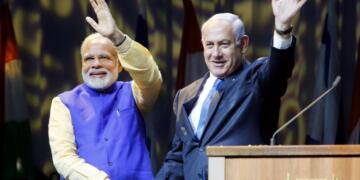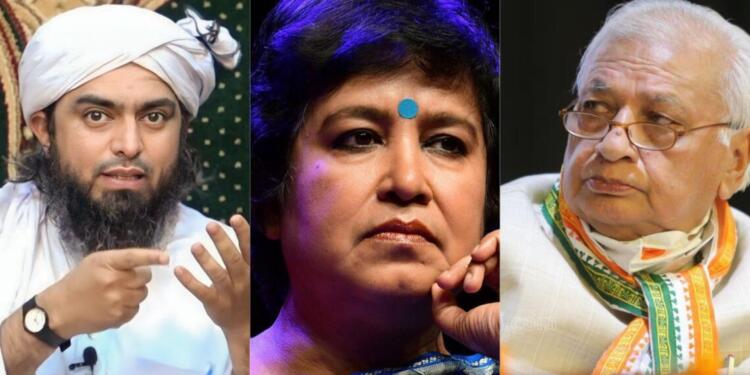The entire world is plagued by Islamic terrorists and extremists. From spreading terror in the name of jihad, issuing threats like “Sar Tan Se Juda” (call for demanding punishment by beheading), to outright murders, extremists have many faces. Despite knowing the truth, prominent persons from the Muslim community have been reluctant to openly speak against extremism. However, some Muslims including clerics have gathered the courage to speak out against fundamentalism. Here are some prominent figures who have spoken out against Islamic extremism:
Pakistani Cleric Supports Nupur Sharma:
When Islamic radicals around the world were condemning Nupur Sharma over her comments about Prophet Muhammad and issuing death threats, no cleric in India came forward to support her, despite killings occurring over her statement. However, Pakistani cleric Engineer Mohammad Ali openly defended Nupur Sharma. He argued that Muslim panelists had provoked her first, which led her to make those comments. He stated that the first offender was the Muslim who had spoken about another religion on live TV. Ali emphasized that those protesting against Sharma should understand that she was only retaliating after being provoked.
A Bangladeshi writer questions the claim of Islam as a religion of peace:
Taslima Nasreen, a Bangladeshi writer living in exile due to her writings on women’s oppression and certain truths about Islam, has been vocal against Islamic extremism. In a post on July 3, 2016, after the Dhaka attack, she wrote, “For humanity’s sake, please stop saying that Islam is a religion of peace. This can no longer be accepted.” She also pointed out that the terrorists involved in the Dhaka attack came from affluent families and attended good schools, challenging the narrative that poverty and illiteracy lead people to terrorism. Nasreen continues to speak out against Islamic terrorism and fundamentalism, stating that extremism leads to terrorism, and brainwashing over long periods is what creates terrorists.
Dr. Wafa Sultan Criticizes Islamic Terrorism:
Dr. Wafa Sultan, an Arab American psychiatrist and Islamic scholar, criticized Islamic terrorism during an event in the United States on July 15, 2024. She accused radical Islamists of using Islam not as a religion, but as a tool for terror. Sultan emphasized that extremists spread fear, overthrow democratic governments, and forcibly convert people. She stated that millions of extremists are willing to die for their cause, leading to increased global fear of Islamic extremism.
डॉक्टर वफा सुल्तान ने वही सच्चाई उजागर की है जो पूरी दुनिया को पता है।
बात अमेरिका के लिए कह रही हैं लेकिन लागू सभी गैर मुस्लिम देशों के लोगों के लिए होता है।
ये सभी देश गहरी नींद में सो रहे हैं। जब जागेंगे तो सब कुछ उजड़ चुका होगा।
ये इस्लाम को धर्म के लिए नहीं, हथियार के तौर… pic.twitter.com/SewIZ5zsEj
— P.N.Rai (@PNRai1) July 15, 2024
Arif Mohammad Khan Questions Sharia Law:
Following the murder of tailor Kanhaiya Lal in Udaipur in support of Nupur Sharma, Bihar’s Governor Arif Mohammad Khan expressed his concerns about the role of madrasas in promoting extremist ideologies. In a July 4, 2022 interview, Khan questioned the Sharia law, stating that those advocating for Sharia should move to countries where it is already implemented. He also spoke out against the “Sar Tan Se Juda” slogan, condemning the violence.
Pakistani Islamic Scholar Criticizes Madrasa Education:
Pakistani Islamic scholar Javed Ahmad Ghamidi, in an interview on September 3, 2024, expressed his views on the roots of terrorism. Ghamidi argued that terrorism stems from the teachings of some madrasas and certain clerics who support radical ideologies. He criticized certain interpretations of Islam, which include the belief that apostates should be executed and that only Muslims should have the right to rule the world, calling these beliefs dangerously extreme.
Cleric Condemns Attacks on Shia Muslims:
After a terrorist attack in Khurram, Pakistan, that killed over 100 Shia Muslims, Maulana Yasub Abbas, General Secretary of the All-India Shia Personal Law Board, condemned the violence in a press conference on November 21, 2024. He called it an attack on humanity and urged for a global condemnation of Islamic terrorism. Abbas also criticized the role of Petro-dollars from Saudi Arabia in funding terrorism and labeled those justifying violence in Islam’s name as humanity’s greatest enemies.
Saudi Cleric Criticizes Islamic Extremism:
On October 19, 2024, Saudi cleric and Islamic scholar Sheikh Asim al-Hakeem criticized Islamic extremism and admitted that mosques are sometimes used to plan violence. He stated that, in some instances, mosques have become places where plans for warfare against non-Muslims are made, and this needs to be addressed.
“इस्लाम में, मस्जिदें गैर-मुसलमानों के खिलाफ युद्ध की योजना बनाने और शुरू करने के लिए हैं”
– इस्लामिक विद्वान, शेख असीम अल-हकीम pic.twitter.com/5rMLK3rLqe
— Dr. Anita Vladivoski (@anitavladivoski) October 19, 2024
Indian Clerics Condemn Attacks on Hindus in Bangladesh:
On December 9, 2024, during a program organized by the Jamiat Ulema-e-Hind in Kishanganj, Bihar, Maulana Shahabuddin Rizvi condemned the attacks on Hindus in Bangladesh. He described such attacks as anti-Islamic and called for peaceful coexistence. Another cleric, Mahmood Syed Asad Madani, also condemned the violence, urging for peace and harmony in the region.
Mohsin Raza Criticizes Fatwa Against New Year Celebrations:
On December 30, 2024, Mohsin Raza, an Islamic scholar, criticized a fatwa issued by the All India Muslim Jamaat that prohibited Muslims from celebrating the New Year. Raza described this fatwa as an example of extremist thinking and urged people to distance themselves from such radical elements. He also called on national agencies to keep a watch on individuals who pose a threat to national harmony.
Gulani Condemns Extremist Influence in Himachal Pradesh:
On December 31, 2024, SNA Gulani, an Islamic scholar and president of the Himachal Pradesh Minority Welfare Council, condemned the growing influence of Islamic extremists in the state. He expressed concern over the spread of terrorism and alleged that extremist Muslims were forcing Hindu women to convert to Islam and taking them to other states. Gulani further claimed that the Dharampur Jamia Mosque in Solan was the headquarters for anti-Hindu activities in the state.
Respected Himachal Pradesh Islamic scholar SNA Gilani:
Radical muslims from outside have become nuisances in HP. Hindu women are being converted and taken outside. Famous Jama Masjid Dharampur has become den of terrorists. They pose threat to defence establishments near it! pic.twitter.com/ZFVDBOM9Xu
— Megh Updates 🚨™ (@MeghUpdates) January 1, 2025
All of these individuals, despite facing extreme threats and pressures, have shown remarkable courage in speaking out against Islamic extremism, terrorism, and the distortion of religious teachings. Their voices provide a much-needed perspective on the dangers posed by radical ideologies and the need for reform within the Muslim community to foster peace and understanding.























